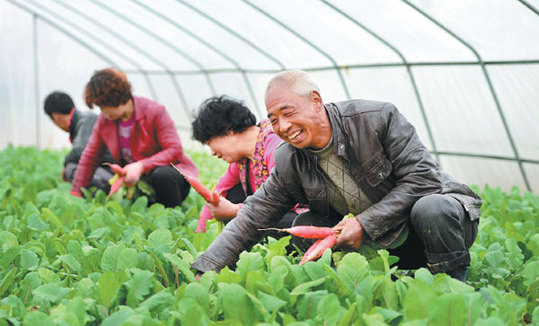Making poverty history in one of China's poorest provinces
China Daily, July 29, 2016 Adjust font size:

Liu Xiaoyang, a vegetable farmer in Chengxian, Gansu province, works in his greenhouse alongside fellow villagers. Zhang Meng/Xinhua
A raft of measures has been introduced to raise living standards in the remote, mountainous area. Zhang Yuchen reports from Tianshui, Gansu province.
A bright smile played across Fang Najia's tanned, wrinkled face as she explained the measures being taken to help her family escape the poverty trap.
The 50-something from Yawan, a village in Gongchang county in the south of Gansu, one of China's poorest provinces, is one of millions of beneficiaries of a poverty-alleviation program that began in 2013.
Few outsiders would describe Fang's family of four, whose details were entered in a poverty database last year, as impoverished. Unlike their less-prosperous neighbors, the family's courtyard contains three straw-and-mud houses, but as average villagers their combined income is only about 3,000 yuan ($450) a month.
While that's just about enough to live on, it isn't enough to lift the burden of the 8,000 yuan Feng's daughter has to pay every year to attend a university in the eastern province of Jiangxi.
After Gongchang's leaders had collected information about the situations of households across the county to compile the poverty database, Fang's family was deemed eligible to receive aid from a program designed to help people who are being pushed into poverty by the cost of higher education, or through illness and disability.
Under the program, Fang's daughter is permitted to collect an annual loan of 10,000 yuan from a special education aid program operated by the county government. The loan, which will be interest free until she graduates and starts work, means she can continue her studies.
For their part, Fang and her husband can claim a low-interest, five-year loan of 50,000 yuan. If they invest the money in a mushroom-cultivation project in the village, the family will receive 4,000 yuan at the end of the year. When the contract expires, the family can repay the original sum, plus a small amount of interest, and arrange another loan. Together, the programs account for 15 percent of the county's annual budget.
Lasting solutions
Zhang Wengang, deputy head of Gongchang, said that before the project began, every person in the county classified as impoverished was allotted the national 100 yuan minimum monthly living allowance, which was a drain on resources and provided no lasting solutions.
Fang's family has enjoyed support from similar programs organized by different levels of the local government, which has been working to alleviate poverty since 2013, when President Xi Jinping visited the region and demanded better conditions for the rural poor.
Gansu has a population of nearly 26 million, and at the time of Xi's visit nearly 7 million people had been assessed as living in poverty. By the end of last year, after the measures started to take effect, the number had fallen to about 3 million, a step towards achieving the target of zero poverty nationwide by 2020, as outlined in the 13th Five-Year-Plan (2016-20).
To ensure resources are targeted at those in greatest need, the Gansu government intends to build a comprehensive database of the provincial poor. The guaranteed minimum income is being extended to a larger number of families, and a range of new social security policies is being introduced in areas such as education, health and housing.
"When I was assigned to my post nine years ago, I realized that conditions have remained unchanged for decades in some mountain villages," said Diao Xiaoling, a researcher with the publicity department of the Gansu office of poverty alleviation and development. "Now, things have really changed: people no longer dress in tattered clothes, houses are being renovated, residents are being relocated and new infrastructure is under construction - even people's attitudes have changed."